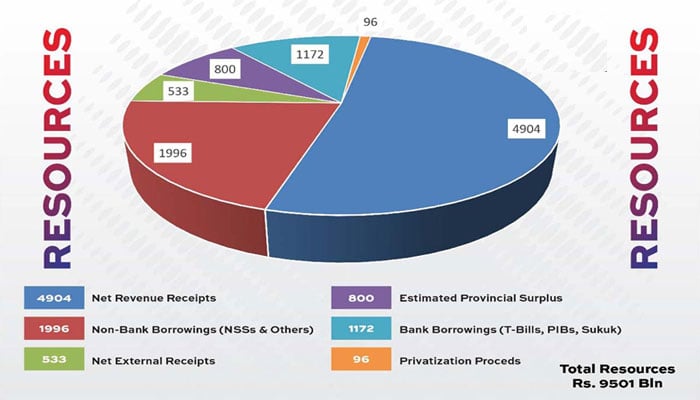Analysis: A pragmatic budget
A 5pc GDP growth target for FY23 is neither advisable nor likely and the IMF programme will be secured, allowing friendly countries to retain support and the government to refinance debt
Caught between a rock (IMF) and a hard place (popularity), the commodity supercycle and devaluation came to the government’s rescue to help bridge the tax revenue target through higher import values.
This allowed the FM to limit the impact of additional taxes and find the space to retain some element of growth. However, a 5pc GDP growth target for FY23 is neither advisable nor likely. The IMF programme will be secured, allowing friendly countries to retain support and the government to refinance debt. The dilemma is that inflation, which undermines government’s popularity, will help it meet the tax revenue target and secure the IMF programme.
However, reliance on the commodity supercycle to meet revenue targets is not a sustainable solution and mini-budgets can be expected if it subsides.
Devoid of political will to broaden the tax base, the budget uses the traditional formulae of taxing the taxed through windfall tax on companies and individuals earning over Rs300 million, 3pc higher tax on banks and compression of salary tax slabs. It could have been worse for the formal sector. At least, some direction is visible in taxing immoveable property. Import levies are to be rationalised on 400 lines to promote manufacturing, initial allowance on capital expenditure has been doubled and non-filers will have to pay advance tax at twice the rate hitherto applicable on purchase of 1600cc and larger cars.
To its credit, the government has reversed the retrogressive sales tax on solar equipment and seeds. Also, agricultural equipment will be exempted from import duty. An industrial policy is being developed and SEZs are to be accelerated to promote investment. Promises of prompt refund of taxes and payment of rebates have been made in the past. There is a need to walk the talk. Imports are forecast to decline and exports to rise. However, there are no visible measures in the budget to facilitate this.
Notwithstanding, a 20-year-old crisis of funding a bloated government, losses of state-owned enterprises and mounting debt service charges, the government found space to increase government wages and pensions.
The FM had an unenviable task of making a budget under tough conditions. Whilst business expected reversal of double taxation of intercorporate dividends and restoration of incentive to list companies on the PSX, this will need to wait. Resources need to be deployed on more focused and targeted subsidies to the poor.
The writer is CEO of Pakistan Business Council.
-
 Prevent Cancer With These Simple Lifestyle Changes
Prevent Cancer With These Simple Lifestyle Changes -
 Experts Reveal Keto Diet As Key To Treating Depression
Experts Reveal Keto Diet As Key To Treating Depression -
 Inter Miami Vs Barcelona SC Recap As Messi Shines With Goal And Assist
Inter Miami Vs Barcelona SC Recap As Messi Shines With Goal And Assist -
 David Beckham Pays Tribute To Estranged Son Brooklyn Amid Ongoing Family Rift
David Beckham Pays Tribute To Estranged Son Brooklyn Amid Ongoing Family Rift -
 Jailton Almeida Speaks Out After UFC Controversy And Short Notice Fight Booking
Jailton Almeida Speaks Out After UFC Controversy And Short Notice Fight Booking -
 Extreme Cold Warning Issued As Blizzard Hits Southern Ontario Including Toronto
Extreme Cold Warning Issued As Blizzard Hits Southern Ontario Including Toronto -
 Lana Del Rey Announces New Single Co-written With Husband Jeremy Dufrene
Lana Del Rey Announces New Single Co-written With Husband Jeremy Dufrene -
 Ukraine-Russia Talks Heat Up As Zelenskyy Warns Of US Pressure Before Elections
Ukraine-Russia Talks Heat Up As Zelenskyy Warns Of US Pressure Before Elections -
 Lil Nas X Spotted Buying Used Refrigerator After Backlash Over Nude Public Meltdown
Lil Nas X Spotted Buying Used Refrigerator After Backlash Over Nude Public Meltdown -
 Caleb McLaughlin Shares His Resume For This Major Role
Caleb McLaughlin Shares His Resume For This Major Role -
 King Charles Carries With ‘dignity’ As Andrew Lets Down
King Charles Carries With ‘dignity’ As Andrew Lets Down -
 Brooklyn Beckham Covers Up More Tattoos Linked To His Family Amid Rift
Brooklyn Beckham Covers Up More Tattoos Linked To His Family Amid Rift -
 Shamed Andrew Agreed To ‘go Quietly’ If King Protects Daughters
Shamed Andrew Agreed To ‘go Quietly’ If King Protects Daughters -
 Candace Cameron Bure Says She’s Supporting Lori Loughlin After Separation From Mossimo Giannulli
Candace Cameron Bure Says She’s Supporting Lori Loughlin After Separation From Mossimo Giannulli -
 Princess Beatrice, Eugenie Are ‘not Innocent’ In Epstein Drama
Princess Beatrice, Eugenie Are ‘not Innocent’ In Epstein Drama -
 Reese Witherspoon Goes 'boss' Mode On 'Legally Blonde' Prequel
Reese Witherspoon Goes 'boss' Mode On 'Legally Blonde' Prequel




